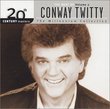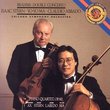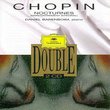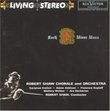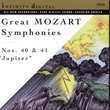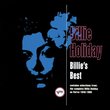| All Artists: Wolfgang Amadeus Mozart, Johannes Wildner, Vienna Mozart Academy Title: Mozart: Concertos for Bassoon, Oboe, Clarinet Members Wishing: 0 Total Copies: 0 Label: Naxos Original Release Date: 1/1/1990 Re-Release Date: 6/30/1992 Genre: Classical Styles: Forms & Genres, Concertos, Historical Periods, Classical (c.1770-1830), Instruments, Reeds & Winds Number of Discs: 1 SwapaCD Credits: 1 UPCs: 730099534529, 4891030503458 |
Search - Wolfgang Amadeus Mozart, Johannes Wildner, Vienna Mozart Academy :: Mozart: Concertos for Bassoon, Oboe, Clarinet
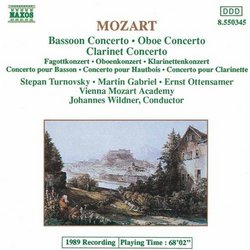 | Wolfgang Amadeus Mozart, Johannes Wildner, Vienna Mozart Academy Mozart: Concertos for Bassoon, Oboe, Clarinet Genre: Classical
Format: 9 tracks, Audio CDRun Time: 68 minutesPublisher: NAXOS of AmericaISBN: 0-730099534529 |
Larger Image |
CD DetailsSynopsis
Product Description Format: 9 tracks, Audio CDRun Time: 68 minutesPublisher: NAXOS of AmericaISBN: 0-730099534529 Similar CDsSimilarly Requested CDs
|
CD ReviewsLong live Amadeus Hohenzolern@aol.com | LA | 08/10/2000 (5 out of 5 stars) "Mozart is better known for his symphonies and operas and even his piano concerti. His music for flute, clarinet and bassoon is absoultely divine. This is the genius of Mozart. His melodies are rich, soft and lyrical. The music is superb. Especially if you like the perfectionized style of Mozart's music. This is a wonderful cd. I would purchase it because it makes a great background music for meditation, for an evening party or just for fun. Mozart is miraculous and the genius that is the boy wonder who became a great composer is truly evident in the little bits of music that hardly got recognized. The three concertos here are excellent. Also, look for his 4 horn concertos which are spectacular, and his music for oboe and other winds. This is a great cd and I urge any classical fan to buy it." Excellent value introduction to Mozart's wind concerti sphaerenklang | UK | 06/05/2004 (4 out of 5 stars) "This is a highly enjoyable disc of the bassoon, oboe and clarinet concerti written in the 3 main stages of Mozart's career. While it has a few shortcomings, it's unlikely you will find a better performance of the bassoon or clarinet concertos at this price.The bassoon concerto receives a lively and well-balanced performance. The soloist has a full and very mellow tone but does not lack character, and produces unusually flexible dynamic shaping in melodic passages. Orchestral accompaniment is notably colourful with horns and oboes prominent in the outer movements and muted strings in the slow movement. Cadenzas are tasteful: altogether a very satisfying performance.The oboe concerto is somewhat disappointing after this: the tone of this soloist is uniformly loud and brilliant, and (in contrast to the other two items) the solo is balanced absurdly strongly against the orchestra. When the solo oboe plays with string accompaniment one can scarcely hear the strings at all! Quite unrealistic. The concerto has a lot of ornaments, mainly trills, which are done in a rather uniform and inflexible way. In almost all cases, the performer starts the trill with the lower note. But it has been known for about 70 years that this is only appropriate for 19th-century music: in the Baroque and Classical eras the trill started on the upper note almost always. These Viennese stick to their 19th-century habits and unfortunately miss the possible expressive effects of beginning on the upper note.The clarinet concerto is virtually on the same level as the bassoon concerto for performance: the soloist is realistically balanced against the orchestra and employs very varied dynamics and tone colours, as well as faultless bravura passages. However there are a couple of interpretive decisions that don't quite work. The conductor slows down, and loses flow and momentum, in the transition sections of the first movement, which might work in Schubert but doesn't here. In the slow movement the little connecting phrases for strings between the phrases of the soloist's melody are somewhat pulled out of shape and draw attention to themselves, rather than leading unobtrusively from one phrase to the next. The finale is perhaps a little slow - Allegretto rather than Allegro. However these on the whole do not interfere with the enjoyment of the performance. A good way to familiarise yourself with these works." Very calm M. Stewart | UK | 06/05/2006 (4 out of 5 stars) "The best concerto on this extremely good CD is the Bassoon concerto which is played with extreme vibrancy and operatic character, just how I like the Mozart concerti played. However in contrast to the Oboe and Bassoon concerti, the clarinet concerto is much more calm and complatative, although it is played with an extremely beautiful tone and well thought out articulation, it doesn't show off the dynamic range of the instrument very well, it is too slow and not nearly passionate enough. Furthermore there is a lack of operatic character. This is, in my opinion essential in this concerto, I didn't feel that the clarinetist brought out the obviously wanted difference in tone between the lower and higher registers.
Having made these negative comments, it must be stated that this is a welcome break from what can often be very samey recordings. I would recommend this recording simply because of the vibrancy of the Oboe and Bassoon concerti and the "different" nature of the Clarinet concerto and also the beautiful tone on the clarinet." |

 Track Listings (9) - Disc #1
Track Listings (9) - Disc #1

